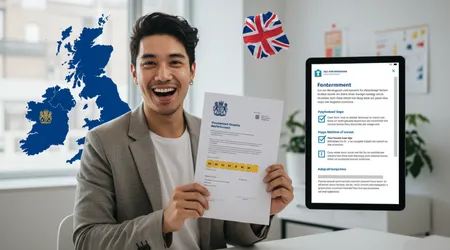Government Grants in the UK: How to Apply for Free Money

Government grants spark curiosity for anyone seeking financial support without repayment strings.
In 2025, the UK’s funding landscape offers opportunities for individuals, businesses, and communities, yet navigating it feels like deciphering a maze.
From small enterprises to aspiring homeowners, these funds can transform dreams into reality. But where do you start?
This guide unravels the process, blending practical steps with sharp insights to help you secure what’s available. Expect clarity, real-world examples, and a touch of wit to keep you engaged.
Let’s dive into the world of free money because who wouldn’t want a slice of that pie?
The UK’s grant system isn’t a secret vault, but it’s not an open book either. Each year, billions flow through schemes like the Levelling Up Fund or Innovate UK, targeting specific goals think green energy or rural development.
Missteps, like missing deadlines or misreading eligibility, can lock you out. This article isn’t just a roadmap; it’s a conversation about seizing opportunities with confidence.
Ready to unlock the potential of government grants? Let’s explore what’s out there and how to claim it.
What Are Government Grants, Really?
Picture government grants as seeds planted by the state to grow opportunity. Unlike loans, they don’t demand repayment, making them a golden ticket for eligible applicants.
They fund everything from startup ventures to home insulation upgrades. In 2023, the UK disbursed £7.2 billion in grants, per the National Audit Office, fueling projects nationwide.
But here’s the catch: they’re not handouts. You need to align with strict criteria.
Grants vary wildly some cover education, others boost tech innovation. Take Sarah, a Bristol-based entrepreneur who tapped a £10,000 grant to launch her eco-friendly café.
Her success hinged on matching her vision to a local council’s sustainability goals. Without that alignment, applications fizzle. Research is your first step; skimping here is like sailing without a compass.
Curious about what’s out there?
Websites like GOV.UK list hundreds of schemes, updated regularly. Don’t expect a one-size-fits-all solution each grant has a purpose.
++ How to Apply for Council Housing in the UK
Knowing this shapes your approach, saving time and frustration. Why chase funds that don’t fit your goals?
The beauty of government grants lies in their diversity. From arts to agriculture, there’s something for most sectors. Yet, competition is fierce.
Understanding the “why” behind each scheme say, reducing carbon emissions gives you an edge. It’s less about luck, more about strategy.

Who Can Apply for These Funds?
Eligibility for government grants isn’t a free-for-all. Individuals, businesses, and charities qualify, but each scheme sets its own rules.
Some target specific groups like young entrepreneurs or rural communities. Others prioritize innovation, demanding proof of groundbreaking ideas. Check GOV.UK for specifics before diving in.
Consider Mark, a Yorkshire farmer who secured £15,000 to modernize his dairy operation. His application shone because he studied the Rural Payments Agency’s criteria.
Also read: Child Benefits in the UK: How to Claim Them
In contrast, vague or rushed submissions rarely make the cut. Tailoring your pitch to the grant’s aims is non-negotiable.
Don’t assume you’re excluded. Many overlook government grants thinking they’re for “big players.” Small startups, freelancers, even students can qualify for niche funds. The key?
Digging deep into eligibility details. Ask yourself: does my project match their mission?
Some grants focus on location think deprived areas under the Levelling Up Fund. Others prioritize demographics, like women-led businesses.
Knowing your category sharpens your application. It’s like choosing the right key for a lock precision matters.
Where to Find the Right Grant
Finding government grants starts with reliable sources. GOV.UK is the gold standard, listing schemes by sector and region.
Local councils also advertise smaller funds, often less competitive. Don’t sleep on industry bodies they flag niche opportunities others miss. Bookmark these sites for updates.
Search smartly. Use filters on GOV.UK to narrow options by eligibility or goal. For instance, Innovate UK suits tech startups, while Arts Council grants fit creatives.
Mismatched applications waste time. Ever tried fitting a square peg in a round hole? Exactly.
Read more: UK Universal Credit: Who is Eligible and How to Apply
Beyond websites, network locally. Business hubs or community boards often share grant alerts.
A Leicester baker learned of a £5,000 retail grant via her chamber of commerce, beating online applicants. Real-world connections uncover hidden gems.
Patience pays off here. New government grants emerge regularly, especially post-budget announcements. Set Google Alerts for “UK grants 2025” to stay ahead.
Missing a deadline because you didn’t check recently? That’s a rookie move.
How to Craft a Winning Application
Applying for government grants demands precision. Start by reading the guidelines twice. Each scheme lists priorities, like job creation or sustainability.
Your application must mirror these, or it’s game over. Clear, concise writing wins over jargon-heavy fluff.
Structure matters. Outline your project’s goals, budget, and impact.
Take Sarah’s café: her application detailed how her business would cut waste, aligning with council aims. Numbers help show costs and expected outcomes. Vague plans don’t inspire confidence.
Evidence seals the deal. Past successes, like Mark’s farm upgrades, prove you’re capable.
No track record? Highlight skills or partnerships. Why should they trust you with public funds? That’s the question to answer.
Deadlines are brutal. Submit early to avoid last-minute glitches. GOV.UK’s portal tracks your progress, but don’t procrastinate. A rushed application screams carelessness, and reviewers notice.
Follow-up is key. Some schemes allow queries post-submission. Polite emails show commitment. Don’t pester, but don’t vanish either.
Staying visible keeps your application in mind.
| Grant Scheme | Purpose | Funding Range | Eligibility |
|---|---|---|---|
| Innovate UK | Tech innovation | £25,000–£2m | SMEs, startups |
| Levelling Up Fund | Regional growth | £20m–£50m | Local councils |
| Rural Payments | Farm upgrades | £2,000–£100,000 | Farmers, growers |
| Arts Council | Creative projects | £1,000–£100,000 | Artists, groups |
Common Pitfalls to Avoid
Mistakes sink applications for government grants. Topping the list?
Ignoring eligibility rules. Applying for a startup grant as an established firm wastes everyone’s time. Read the fine print always. Assumptions lead to rejection.
Another trap: sloppy budgets. Reviewers spot inflated costs or vague estimates instantly. Be realistic, like Mark justifying every penny for his dairy upgrades. Transparency builds trust; dodgy numbers don’t.
Don’t skip supporting documents. Missing accounts or references can disqualify you, no matter how brilliant your pitch.
Sarah nearly lost her café grant over a forgotten tax return. Double-check everything.
Procrastination kills. Late submissions aren’t considered, period. Set reminders weeks ahead. Life gets busy, but missing a shot at free money stings worse.
Overcomplicating your pitch hurts too. Jargon or fluff buries your point.
Clear language, like explaining your project to a friend, works best. Simplicity doesn’t mean dumbing down.
What Happens After You Apply?
Post-application, the wait begins. Most government grants take weeks to months for review, depending on the scheme.
Innovate UK, for instance, often updates within eight weeks. Patience isn’t optional it’s required.
You might face queries. Funders could request clarification on budgets or timelines. Respond promptly and clearly.
Sarah’s quick reply to a council email clinched her café funding. Silence looks like disinterest.
If approved, funds don’t arrive instantly. Paperwork, like grant agreements, comes first. Read these carefully terms dictate how money’s spent. Breaching them risks repayment demands.
Rejections happen. Don’t despair; ask for feedback. Many schemes, like Arts Council, offer notes to improve next time.
Mark tweaked his second application and won. Persistence pays.
Track your spending if funded. Audits are common, especially for larger grants. Keep receipts and records tidy. Sloppy accounting can unravel your success.
Maximizing Your Grant’s Impact

Securing government grants is just the start. Using funds wisely ensures lasting impact.
Plan meticulously allocate every pound to its purpose. Sarah’s café thrived because she stuck to her budget.
Report progress to funders. Many schemes require updates, like job creation stats or project milestones. Clear reports build trust for future applications. Mark’s farm reports opened new grant doors.
Leverage success publicly. Share your story on social media or local press.
A Devon charity’s £20,000 grant-funded youth club gained traction after a BBC feature. Visibility attracts more support.
Reinvest outcomes. Profits from a funded project can fuel growth. Sarah’s café profits funded a second location. Think long-term grants are stepping stones, not endpoints.
Connect with peers. Grant recipients often share tips at industry events. A London startup founder learned budgeting tricks at an Innovate UK workshop. Community amplifies success.
Why Grants Matter in 2025
The UK’s economic landscape makes government grants vital now. Rising costs and global shifts strain budgets, from startups to households. Grants ease that pressure, fueling growth without debt.
In 2024, 62% of small businesses used grants to survive, per the British Chambers of Commerce.
They’re also tools for change. Green energy grants drive net-zero goals, while education funds bridge skill gaps.
Imagine grants as levers small pulls create big shifts. Ignoring them limits your potential.
Yet, awareness lags. Many miss out, assuming grants are too complex. That’s a myth. With effort, anyone can apply. Why let free money slip through your fingers?
Grants shape communities too. Funded projects, like rural broadband, boost local economies. Supporting them isn’t just personal gain it’s collective progress. That’s the bigger picture.
Conclusion
Navigating government grants feels daunting, but it’s a path worth treading. From Sarah’s eco-café to Mark’s modernized farm, real people turn funding into reality daily.
The UK’s grant system, though intricate, rewards those who prepare, research, and persist. Start with GOV.UK, align your goals, and avoid common traps.
Success isn’t guaranteed, but effort tilts the odds. In 2025, with billions available, there’s no better time to act. So, what’s stopping you? Free money awaits grab it with both hands.
Frequently Asked Questions
1. How long does it take to get a grant approved?
Approval varies small grants may take weeks, larger ones months. Innovate UK often decides within eight weeks. Check scheme details.
2. Can individuals apply for government grants?
Yes, many schemes support individuals, like students or homeowners, but eligibility depends on the grant’s focus. Always verify criteria.
3. What if my application is rejected?
Rejections are common. Request feedback, refine your pitch, and reapply. Persistence often leads to success, as Mark’s story shows.
4. Are grants taxable?
Some are, some aren’t business grants often count as income. Consult HMRC or an accountant to confirm your situation.
5. Do I need a business plan for every grant?
Not always, but most require a clear project outline. Detailed plans, like Sarah’s, boost credibility and approval odds.
